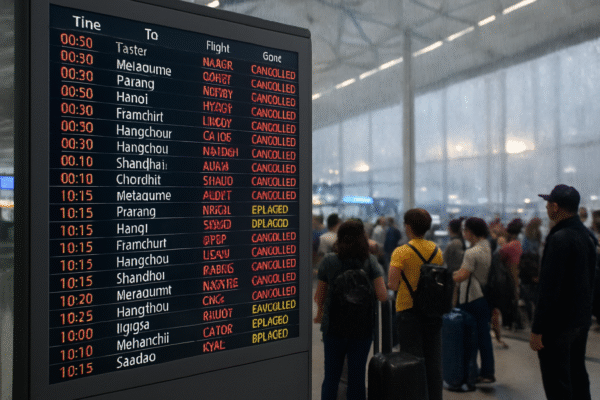Greece Launches Cruise Passenger Fees in Santorini, Mykonos to Combat Overtourism and Boost Island Infrastructure
In a bid to regulate tourism and alleviate pressure on its most visited destinations, the Greek government has implemented a new seasonal disembarkation fee for cruise passengers arriving at popular islands such as Santorini and Mykonos. Effective from June 1, 2025, through September 30, 2025, passengers disembarking at these hotspots will be charged €20 per visit — a bold move aimed at reducing overtourism and reinvesting in local infrastructure.
The new regulation, announced by Greece’s Ministry of Maritime Affairs and Insular Policy, comes amid mounting concerns over the environmental, social, and infrastructural toll caused by the explosive growth in cruise arrivals. According to the Hellenic Ports Association, Santorini hosted 800 cruise calls and over 1.3 million visitors in 2023, while Mykonos received 768 ships with approximately 1.29 million passengers. Together with Piraeus near Athens, these three ports accounted for 57% of the country’s cruise tourism traffic last year, as reported by the Cruise Lines International Association (CLIA).
Seasonal Fee Structure Across Greece’s Islands
The new fee system applies nationwide, covering Greece’s six major island groups — the Cyclades, Dodecanese, North Aegean, South Aegean, Ionian Islands, and Crete. The disembarkation charge varies by season:
- High Season (June 1 – September 30): €20 per passenger at top-tier destinations like Santorini and Mykonos; €5 at other islands
- Shoulder Season (April, May, October): €12 for major ports; €3 for other islands
- Winter Season (November to March): €4 for major ports; €1 at other islands
These charges will be collected digitally through a platform managed by cruise companies and agents, with quarterly declarations and mandatory payments. Port authorities have the legal authority to deny entry or disembarkation for non-compliance.
Revenue Targeted for Infrastructure Improvements
The government projects annual revenue of over €50 million from the disembarkation fees, which will be funneled into local infrastructure upgrades. Investments will target water management systems, waste disposal networks, transportation facilities, and environmental conservation — all of which have been under immense strain due to the volume of tourism.
Greek Tourism Minister Olga Kefalogianni emphasized the policy’s importance in ensuring long-term sustainability:
“The fees are a step toward responsible tourism. We are committed to maintaining the natural beauty and cultural integrity of our islands for generations to come.”
Impact on Cruise Travelers and Operators
How the fees will affect passengers remains to be seen. Some cruise lines may incorporate the charges into overall pricing, while others might list them as separate service fees. Travelers are advised to contact their cruise providers to verify whether their itinerary includes affected ports and how the new fees may alter their total cost.
Will Sarson, a cruise expert at Riviera Travel, advises passengers to be proactive:
“If you’re sailing through Greece this summer, check your cruise documentation or reach out to the operator directly. The disembarkation fees could be included in your final invoice.”
Overtourism Pressures Prompt Policy Reform
Greece has seen record-breaking tourist numbers in recent years, with islands like Santorini frequently exceeding their carrying capacity. The rise in cruise tourism has brought financial benefits but also environmental degradation, soaring property prices, traffic congestion, and displacement of local residents due to the boom in short-term rentals.
Santorini, with its population of just over 15,000, regularly receives more than 10,000 cruise passengers a day during peak periods. Water shortages have become common, while waste management and transportation systems are stretched thin.
To counter these challenges, the government is pursuing a multipronged strategy that includes passenger limits, diversified tourism campaigns promoting lesser-known destinations, and now, direct revenue collection through cruise disembarkation fees.
A Step Toward Sustainable Tourism
This initiative follows similar moves by other overtouristed destinations, such as Venice, which implemented an entry fee for day-trippers in 2024. Greece’s new cruise tax aligns with global sustainability goals set by the UN World Tourism Organization (UNWTO) and the European Union’s Green Deal.
By incentivizing off-season travel and helping fund local development, Greek authorities hope to strike a balance between economic growth and preservation. “Tourism is a pillar of the Greek economy, but it must be managed wisely,” said Deputy Minister of Shipping and Island Policy Ioannis Pappas.
Conclusion: Responsible Travel for the Future
As cruise tourism continues to grow across the Mediterranean, Greece’s seasonal fee structure marks a significant shift toward responsible tourism governance. For travelers, it’s a reminder of the importance of choosing sustainable travel options and respecting the destinations they visit.
With these proactive steps, Greece aims not just to safeguard its world-famous islands but to ensure that their beauty and heritage can be enjoyed sustainably — long into the future.
For more travel news like this, keep reading Global Travel Wire



















